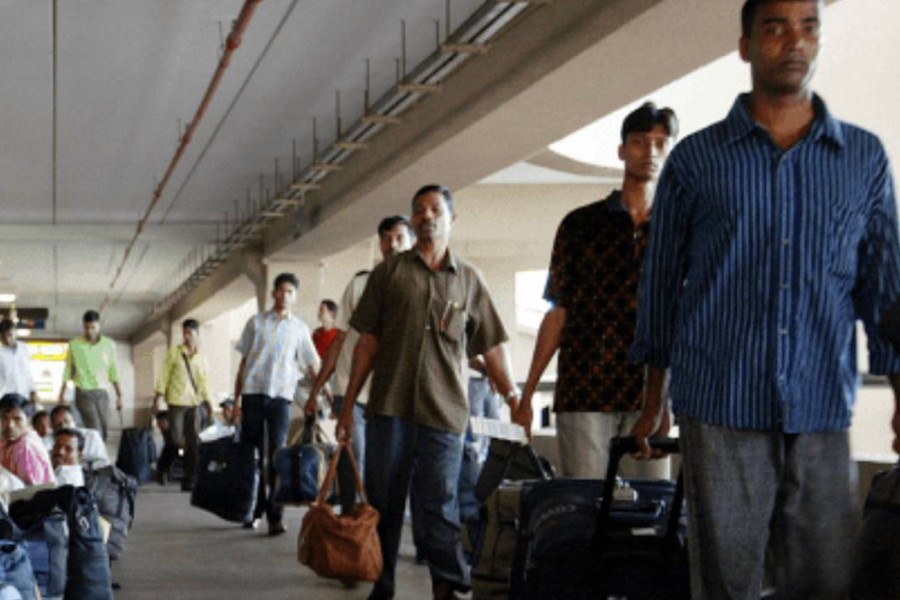The picture of the overseas employment sector in Bangladesh is bleak with thousands of migrants in the dark about their jobs due to coronavirus pandemic.
Jobless workers' homecoming continues. Again, those who came home on leave before the virus outbreak remain stranded here.
Such a volatile situation will impact remittance earnings in the coming days, according to industry insiders and experts.
Data released by expatriates' welfare desk at Hazrat Shahjalal International Airport shows more than 165,658 workers returned home from 29 countries between April 01 and September 30 this year.
The hapless expats have been back home for factors like job cuts, their irregular status and expiration of their job contracts.
On the other hand, most of an estimated 100,000 workers 'on leave' are yet to return to their worksites for travel ban imposed by destination countries.
Even visa and iqama of many workers have expired.
Migration expert Prof CR Abrar said the overseas employment sector is passing through a great crisis. Workers are struggling to save their livelihood.
If the crisis is not managed properly, it will impact employment as well as foreign remittance, he observed.
Mr Abrar, also executive director of Refugee and Migratory Movements Research Unit (RMMRU), said the country is experiencing a spike in remittance inflow during the pandemic.
The government's 2.0-per cent incentive has contributed to the overall remittance income since 2019.
"But I think the current trend is not normal," he said, adding that migrants are remitting more as many are closing businesses or investments before returning from the Middle East.
Workers are trying to send remittance as much as possible as they are also worried about job cuts in the oil-rich Middle-Eastern countries, Mr Abrar said.
Hundi, visa trading, illegal trade have declined in corona time. So, remittance income has got a big jump through formal channel in recent months, he observed.
But it will not continue for long. The government should take effective measures to protect the sector, the expert suggested.
Among the jobless returnees, some 149,018 were males and 16,640 females. Some 135,115 workers returned with passport while 30,543 workers without passport.
A good number of them served imprisonment prior to their departure for home, officials said.
Most of the returnees are from the United Arab Emirates with 44,616 followed by Saudi Arabia 39,188, Qatar 14,911, Oman 10,713, the Maldives 10,483 and Kuwait 9,997.
Due to economic cost of Covid-19, labour-receiving countries started job cuts. So many Bangladeshis have lost jobs, according to officials.
Besides, the workers who went abroad recently did not manage jobs, they cited.
More than 50,000 workers came from Saudi Arabia on leave before coronavirus outbreak. They are facing uncertainty over restarting their work.
Saudi Arabia has extended the validity of iqama for Bangladeshis by 24 days. But workers said most of them cannot go there as they cannot extend validity of visa.
The validity of visa for Saudi-bound workers expired last Wednesday, but many of them could not contact their kafils (sponsors) for procedure seeking visa extension, they added.
At least 120,000 workers who were in the pipeline of going abroad with jobs also failed to do so.
Manpower recruiters said chance is slim to send workers abroad as job markets will not take in workers soon.
Ovibashi Karmi Unnayan Programme (OKUP) chairman Shakirul Islam said Bangladesh lacks coordination and monitoring system in migration management.
He suggested the government strongly deal with the matter diplomatically with job destination countries to take back the stranded workers.
Fresh job opportunities also need to be created for overseas job seekers, he mentioned.
"The government should plan a proper reintegration programme for jobless returnees," Mr Islam said.
When contacted, expatriates' welfare and overseas employment minister Imran Ahmad said they are communicating with the destination countries so that stranded workers can return to work on time.
"We're also implementing several projects for the returned workers, impacted by coronavirus pandemic."


